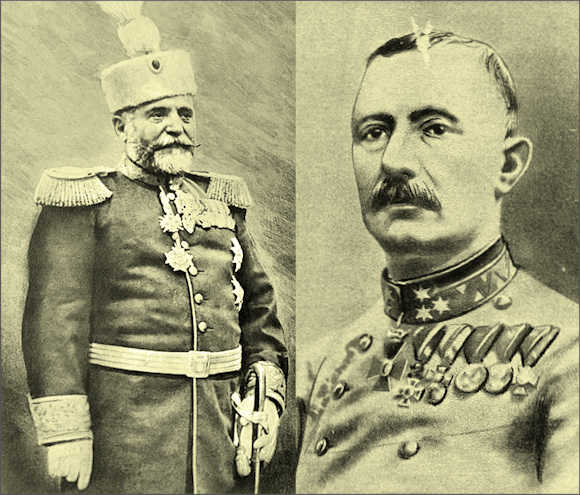 |
| Serbian Artillery |
The Battle of Kolubara, fought between Austria-Hungary and Serbia in November and December 1914, was the second major victory of Serbia over Austria-Hungary in World War I. Heavily outnumbered Serbian Army launched a successful counteroffensive when the world expected its capitulation and once again managed to repulse the Austro-Hungarian invasion. The defeat humiliated Austria-Hungary, which had hoped to occupy Serbia by the end of 1914.
 |
| My Apologies— This Was the Only Map of the Battle I Could Find |
The Serbian Army found itself in a difficult position after the failed offensive in the Austro-Hungarian region of Syrmia in September 1914. The Austro-Hungarian field marshal Oskar Potiorek launched an attack in the west and forced the Serbian Army to retreat to the right bank of the Kolubara River by 16 November. Meanwhile, General Živojin Mišić replaced the wounded Petar Bojović as the commander of the Serbian First Army.
 |
| The Opposing Commanders Živojin Mišić and Oskar Potiorek |
Faced with lack of artillery munition and the approaching well equipped Austro-Hungarian Balkan Army Group numbering about 450,000 men, General Mišić proposed a withdrawal in order to win some time and reorganize his forces numbering about 250,000 men. The chief of the Serbian General Staff, Radomir Putnik, hesitated with the approval of Mišić’s plan because the withdrawal would leave Belgrade undefended. In the end, Putnik accepted the plan and ordered retreat on 29 November.
 |
| Austrian Officers in Serbia |
Potiorek advanced with the Fifth Army to Belgrade and captured the city on 2 December, but he had dangerously overstretched his forces. The Serbs meanwhile received artillery munitions, and Field Marshal Putnik ordered a counterattack on 3 December. The Austro-Hungarian Sixth Army, surprised by the counterattack, was forced to retreat to the left bank of the Kolubara River by 6 December. On 9 December, the Serbian Army crossed the Kolubara River and pushed the Austro-Hungarian forces out of Serbia by 15 December 1914.
The Austro-Hungarians lost about one half of the Balkan Army Group, while Field Marshal Potiorek was retired and replaced by Archduke Eugen of Austria. General Mišić, on the other hand, was promoted to Vojvoda (field marshal), but Serbia suffered heavy casualties as well—about 170,000 Serbs were killed, wounded, or captured—and was not able to take advantage of its victory in the Battle of Kolubara.
 |
| Serbian Infantry |
By October 1915, the Central Powers managed to gain Bulgaria on their side and the German field marshal August von Mackensen launched a coordinated attack on Serbia. The Serbian Army, unable to withstand the attack of combined German and Austro-Hungarian forces in the north and Bulgarian invasion in the east retreated via Montenegro and Albania to the Greek islands, where it reorganized and joined the Macedonian Front in spring 1916. Field Marshal Putnik, who retreated with his army, died in France in 1917.
Sources: Serbia Land of Heroes; Wikipedia; The Military History of the World War

No comments:
Post a Comment